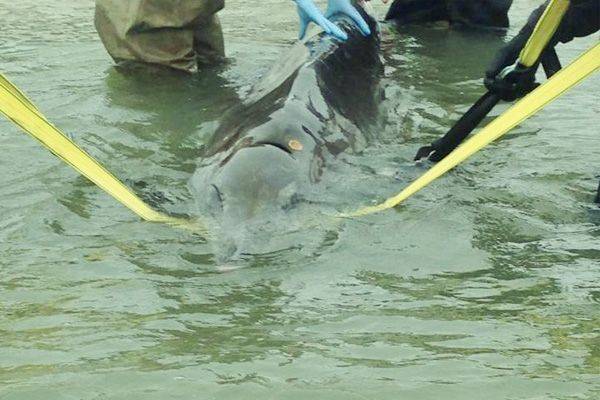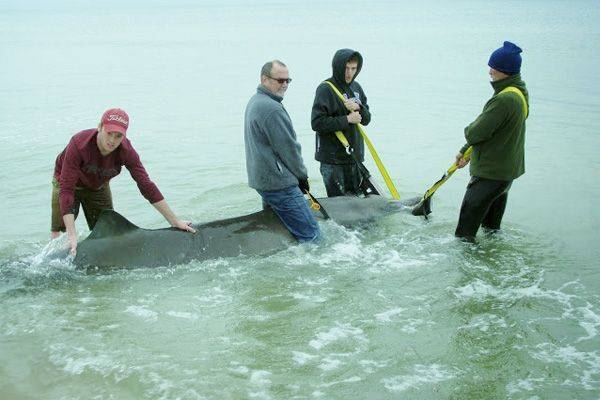by Julia Cunningham
[dropcap]W[/dropcap]hen sea turtles are exposed to prolonged cold water temperatures, they become “cold stunned”. Symptoms include decreased heart rate, decreased circulation, and lethargy. Shock, pneumonia, and death can follow this condition. Turtles residing in St. Joseph Bay, in Gulf County, Florida, are particularly susceptible to cold stunning because the bay is very shallow in parts and cools down rapidly when the air temperature falls. After a 2010 cold stun event where 1800 turtles were rescued in St. Joseph Bay, we as part of a turtle stranding team, have become better prepared for cold stuns. What we didn’t expect in the middle of rescuing sea turtles during January’s “Artic Vortex”, was a rare beaked whale beaching herself. On January 10th, after days of walking and kayaking the St. Joe Bay looking for and transporting cold stunned sea turtles to Gulf World Marine Institute (GWMI) for rehabilitation, we received a call that a dolphin, which was seen swimming in circles in the Gulf of Mexico, the day before, was trying to beach herself. Having participated in dolphin rescues in the past, we were diverted from our turtle search to investigate the reported dolphin.
Upon approach, it was immediately apparent that the mammal was very distressed and struggling, lying parallel to the shore, being rocked by the breakers. Running to her we were able to grab her, and turn her, making sure her blow hole was clear of the water that had been rushing over it, and not allowing her to breathe. As soon as we righted her it sounded like she was gasping for air. It immediately became apparent that this 13 feet beauty was not a dolphin.
Several more people arrived to provide assistance, including the UFL Marine Turtle Research Group, our local turtle patrol and the South Gulf County Fire Department (an official asset provider to GWMI). These First Responders and volunteers were incredible as they stood in the cold water and rain, positioning the whale away from any surf and providing support straps keeping her comfortable and able to breathe until Dr. Lydia Staggs and other GWMI personnel arrived at the scene. “Any stranding is due to the animal being sick or debilitated,” said Secret Holmes-Douglas, Director of animal care and training at GWMI. The whale was compromised and would not have been able to be rehabilitated and released back into her natural habitat. The decision was made to sedate and euthanize her. She was then transported to the National Oceanic and Atmospheric Administrations (NOAA) Southeast Fisheries Science Center in Pascagoula, Mississippi for a necropsy and further study.
Beaked whales are members of the family Ziphiidae which consists of 21 species, but only three to four species are well known because of their mysterious habits and deep water habitat. These toothed creatures are rare air-breathing mammals that have been known to regularly hold their breath on dives up to 3,000 feet deep for an hour at the time, but have been recorded to dive up to 6,194 feet deep for 85 minutes. That’s over one mile deep for an hour and 25 minutes!
On a positive note, several days later, GWMI was able to release 57 rehabilitated sea turtles back into their natural habitat, including 6 critically endangered Kemp’s Ridleys.
Gulf World Marine Institute Incorporated (GWMI) is proud to be part of the Southeast Marine Mammal Stranding Network and the Sea Turtle Stranding and Salvage Network. We work under a permit from National Marine Fisheries Service, U.S. Fish and Wildlife, and Florida Wildlife Conservation Commission. Within these stranding networks, Gulf World plays an important role in rescuing and rehabilitating injured marine mammals and sea turtles throughout the Florida Panhandle. For additional information on GWMI, or to make a donation for to this worthy cause, please visit: www.gulfworldmarineinstitute.org



